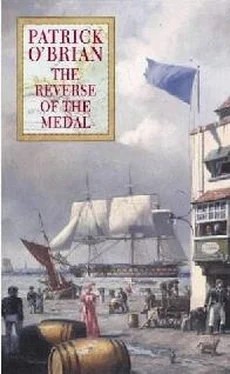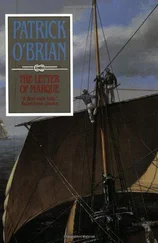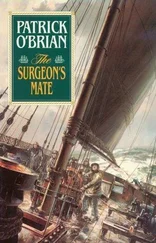The Dittersdorff was a charming piece. It played on in their heads as they rowed through the warm moonlight and the lapping sea back to the Surprise, and it was still playing in Jack's inward ear as he stood on his quarterdeck, waiting to step into his barge the next morning. But it was cut short by the sight of a hoist running up to the flagship's peak. 'Do you know what that is?' he asked his youngsters, six boys gathered there to take part in the ceremony of piping the side - six boys he had taken aboard as children; and even now they were little more. 'No, sir,' said two breaking, unsteady voices and four clear trebles. 'No, sir: we have never seen it before.'
'You are an unobservant set of lubbers,' said Jack. 'You saw it yesterday and you saw it the day before, and a damned unpleasant sight it is. Union at the peak, a court-martial. Mr Boyle, tell the Doctor if he is not here in five seconds he will miss the boat. Mr Mowett, it would be as well to. let Jemmy Bungs go ashore and pick up some old knocked-down slack-casks, enough to give the appearance of a deck-cargo, and about fifty yards of that scrim they use for lining sugar-barrels. He may spend ten pounds.'
Stephen came running with a piece of toast in his hand and hurried down into the barge; Jack followed him, in greater state, to the howl of pipes; and as the barge shoved off he said to himself 'I hope to God this is the last time: it will be a horrible session.'
It was the last time; and it was a horrible session, even more horrible than he had expected. When the court was cleared after the prisoners' last vain and generally irrelevant but sometimes extremely painful statements, the five members considered their verdict, the youngest, Painter, giving his opinion first. He had never sat on a court-martial before and the thought of judging a man's life away troubled him extremely. He turned the matter this way and that, but Stone and Goole dealt with his scruples in a calm, practical, businesslike manner; indeed, as the law stood he had no real choice, and when it came to the formal voting he said 'Guilty' to each name, though in a most hesitant and reluctant voice. Stone, the judge-advocate for. the time being, bent to his table, writing fast and fair: 'find the charges proved
adjudge them and each of them to suffer death by being hanged by the neck on board such of His Majesty's ship or ships, at such time or times and at such place or places
.' He hooked over his paper with a keen, objective eye, nodded, and passed it to the members for their signature: it was an ugly document to put one's name to, and none of the captains relished it, not even Goole. Even less did they relish the next stage, when the prisoners were brought back, and when the bystanders had been silenced so that nothing but ship-sounds and a remote cry of 'Sweepers, sweepers aft, d'ye hear me there?' could be heard, -the judge-advocate read his paper out in a strong, impassive voice, so that through all the legal forms and repetitions each man heard his sentence loud and clear.
It was an ugly business, and after taking a curt, barely civil leave of Goole and the others Jack walked out on deck. On the poop the yeoman of-signals was folding up the court-martial flag, and looking with half-closed shielded eyes over the blazing sunlit water Jack saw that the Surprise was already moving across to her windward anchor, the fife shrilling loud upon her capstan as it turned.
Stephen Maturin was waiting for him at the head of the accommodation-ladder with a face as grave and heavy as his own. As Jack approached he said to Mr Waters' older assistant, 'Three drops each hour, and if possible continue the bark tomorrow,' and walked silently down into the barge.
'Larboard,' said Jack to Bonden, and the moment the boat reached the ship he sprang up the side, glanced fore and aft, saw that everything was in train, and said, 'Mr Mowett: to flag, Request permission to part company.'
If it had not been for the prospect of meeting with a French or American sloop, corvette or frigate, or with a privateer, this last leg of their journey would have been a sad one, for it was indeed a last leg, a run that would probably take the Surprise to the breaker's yard. Her officers and men, a particularly united crew, might say with perfect truth that well handled she was still one of the fastest of her class in the Navy, that her timbers were remarkably sound, and that she was a healthy as well as a happy and weatherly ship; but the fact remained that since she was built in the seventeen eighties frigates had grown very much larger and they had taken to carrying very much heavier guns. The Surprise had been left behind, and she could no more set about a modern American than she could attack a line-of-battle ship. There were still a few Frenchmen she could meet on reasonable terms, but they rarely left port, and the only real likelihood of an engagement, as far as national navies were concerned, was with a sloop or a corvette; there was no glory in taking a sloop or corvette, however, only disgrace in failing to do so, and the Surprise pinned her hopes mainly on the privateers that did so harasss the British and even the neutral trade between the old world and the new, and above all on the notorious Spartan. Of course there was no immortal glory in taking even an unusually heavy and powerful privateer either, but it would be a creditable thing, a thoroughly creditable thing; and if no more splendid opponent offered, then it would round off the commission handsomely. Besides, although no ship of war, public or private, could compare with a fat merchantman in the article of vulgar tangible profit, the Spartan would still be a far from negligible prize: she was remarkably fast, recently built in an excellent yard, and if she were not too much knocked about the Admiralty would certainly buy her into the service; then again there was head-money, five quid a knob, and the Spartan was said to carry a numerous crew.
They looked out for her, therefore, with more than usual zeal; and they did so in spite of the fact that many of them felt the luck had gone out of the ship. Or if not out of her then out of her captain, which was much the same thing. The belief was strongest among those who had been fishermen or whalers, for time and again they had seen that of two skippers with equal experience and skill, fishing the same waters with the same equipment, one would come home with full holds and the other would not. It was a question of the man's luck, a quality or rather an influence that sometimes set all one way, for good or bad, and sometimes shifted like a tide, but a tide whose ebb and flow obeyed laws that no ordinary men could see. The whalers held most to this belief, but it was also quite strong in a number of others, including some who had served longest in the frigate and who were most attached to her captain - hands who had been man-of-war's men from the beginning. There were varying creeds and some important differences of detailed belief, but broadly speaking luck and unluck were held to have little or nothing to do with virtue or vice, amiability or its reverse. Luck was not a matter of deserts. It was a free gift, like beauty in a very young woman, independent of the person it adorned; though just as beauty could be spoilt by frizzed hair and the like so ill-luck could certainly be provoked by given forms of conduct such as wanton pride, boasting of success, or an impious disregard for custom. Carrying parsons for example was unlucky, and yet here was Mr Martin. Reverend Martin was a good, kindly gent, not at all proud, nor above lending the Doctor a hand in the sick-bay or writing an official letter for a man or learning the boys to read; but he was a parson and there was no denying it. White-handled knives were notoriously unfortunate, and so were cats; yet the voyage had started with both aboard. But such things as these and even graver offences against the old ways of the sea were nothing, nothing at all, in comparison with shipping a Jonah, and a Jonah had been shipped at Gibraltar in the person of Mr Hollom, a thirty-five-year-old master's mate. It might have been supposed that the Jonah's death would have removed the misfortune, but not at all, for a downright curse had fallen on the ship when Homer, the gunner, first killed Hollom and Mrs Homer, they being lovers, on Juan Fernandez, and then hanged himself in his cabin some days later, off the coast of Chile. Some held that the curse had been lifted when the gunner was launched over the side sewed into his hammock with two roundshot at his feet; others did not. To the objection that the Surprise had made a number of recaptures Plaice, the oldest and most respected of the prophets of woe, said Yes, but recaptures, though welcome, were not as who should say prizes, and anyhow the last was taken just inside Admiral Pellew's command, which instantly made the poor unfortunate barky and her poor unfortunate Captain eight thousand dollars the poorer. Eight thousand bleeding dollars! The mind could hardly conceive of such a sum. If that was not a curse, Joseph Plaice would like to know just what a curse was meant to be. Then again, the Doctor, who had never been known to miss his stroke with a knife, saw or trepanning-iron - and here Plaice tapped his skull, where a three-shilling piece, hammered into a dome, covered the neat hole Stephen had made on the outward voyage - had almost certainly lost his last patient, the surgeon of the Irresistible, which not only upset him cruel but was clear proof of a curse: and if proof were wanting they only had to look a little farther aft. What but a most uncommon curse could have brought the Captain's misfortune walking into Ashgrove Cottage itself with the Missus there and perhaps Mother Williams too?
Читать дальше
Конец ознакомительного отрывка
Купить книгу












